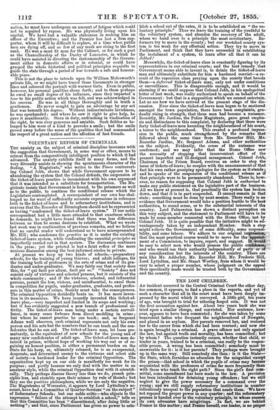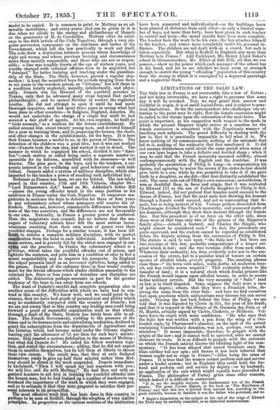THE LOST CHILDREN.
AN incident occurred in the Central Criminal Court the other day, too common, it appears, to find a place in the reports, and yet of such a character that all in the court must have been deeply im- pressed by the moral which it conveyed. A little girl, ten years of age, was brought to trial for uttering forged coin. It was not the first accusation against her. About two years back she was tried upon a similar charge, and convicted. )Ier sentence, how- ever, appears to have been commuted ; for she was taken by some benevolent ladies who frequent the neighbourhood of Newgiite, and placed in an asylum. Her parents removed her, and restored her to the career from which she had been rescued; and now she is again brought up a criminaL A grave offence not only against the law, but against truth and morality, has been committed; but by whom ? The question instantly occurs, whether that child, so tender in years, trained to be a criminal, can really be the respon- sible person. I wrong has been committed ; somebody must be answerable for it: is it her parents? They perhaps were brought up in the same way. Still somebody else then : is it the State— the State, which furnishes no education for the misguided except the prison—that school in which the pupils of crime may become acquainted with the professors of crime far more frequently than with those who teach the right path? Since the girls first com- mittal, some amendment has been made in the law. A provision has been introduced for detaining young offenders; but we still neglect to give the power necessary for a command over the young; and we still supply reformatory institutions in number ridiculously unequal to the population that needs them. We have not reposed the proper power in any quarter; and the reformatory process is handed over to the voluntary principle in whose success its own advocates have misgivings. • In fact, we are behind France in this matter; and Frazee herself; our leader, is no proper
model to be copied. It is common to point to Mettray as an ad- mirable institution ; and every praise that can be given to it is due when we allude to the energy and philanthropy of Demetz or the generosity of N. de Courteilles. Mettray owes its exist- ence to the 66th article of the Code Napoleon, through a very sin-
&cut.perversion consequent on the indolence and laches of the rnment, which left the law practically to work out itself. The code drew a distinction between persons whose knowledge of right and wrong and whose previous training and circumstances make them morally responsible, and those who are not so respon- sible; a line was roughly drawn at the age of sixteen years, and youths charged with criminal offences were to be acquitted but "detained" for better training and teaching under the guardian- ship of the State. The State, however, proved a regular step- mother : it kept the acquitted boys for periods ranging from three to six years in the common prison, as "detenus," but left them in a condition totally neglected, morally, intellectually, and physi- cally. Demetz was the Howard of the youthful prisoner in France, only that he advanced many steps beyond that earlier philanthropist; and he opened Metttay to receive the neglected youths. He did not attempt to open it until he had made thorough inquiries, and had spent three years in seeing what had been done in other countries—in Belgium, England, America. He would not wadertake the charge of a single boy until he had secured a fair staff of agents. At his own expense, he built an " ecole normale," as a nucleus for the future establishment. He called around him about twenty young men, and devoted himself for a year to training them, and to preparing the houses, the sheds, and other changes in the establishment, for the boys. It is here that France becomes a model to us, in the person of Demetz. The detention of the children was a good idea, but it was not worked out—Demetz took the raw idea, and worked it out in detail. The manner in which he organized his school, divided it into " fami- lies "—each section so called being under a separate master re- sponsible for its failures, accredited with its successes—is well known. The plan gave to the boys, and to the teachers, a cor- porate interest in the wellbeing and good behaviour of each indi- vidual. Demetz added a system of military discipline, which also imparted to the teacher a power of reaching each individual boy. Deficient as France has been, we are far behind. The law lately passed in this country, 17th and 18th Victoria, chapter 86— "Lord Palmerston's Act," based on Mr. Adderley's better Bill —places the young offender much in the same position as his confreres in France under the Code Napoleon. It empowers ma- gistrates to sentence the boys to detention for three or four years in any reformatory school whose managers will receive the of- fenders. There are, however, considerable differences between the laws of the two countries, and the differences are not favourable to our own. Naturally, in France a greater power is conferred. Here the magistrate may commit, but we believe that the ma- nners of voluntary schools have felt the most serious incon- veniences resulting from their own want of power over their youthful charges. Perhaps for a similar reason, it has been dif- ftoil to enforce a complete military discipline, with its perfect rainguaation from the head to each individual. Another defect is num serious, and is gravely felt by the ablest men engaged in car- rpm out the practice. In France the reformatory school is a privilege, which takes the youthful offender out of prison, and lightens the sentence, and puts him in a condition at once to feel a moral responsibility and to improve his prospects. In England the sohool presents itself as an increased infliction, being added to the prison. Instead of the ordinary three or four weeks confine- ment for the trivial offences which render children amenable to the criminal law, three or four years of detention and discipline are added. The distinction perhaps accounts in part for the greater tendency of the boys to run away from our schools. The want of Denietz's careful and complete preparation also is another cause of the difficulties with which we have bad to con- tend in this country. We know well, and we could point to in- stances that we have had proofs of personal zeal and ability which may be confidently compared with the country of Demetz; but we are not aware that in this country any leading men could bring forward a proof of successful organization such as that which, through a fault of the State, Demetz has lately been able to ad- duce. The French Government, yielding to the pressure of the times and to its bureaucratic and centralizing tendencies, declined to grant the subscriptions from the departments of Agriculture and the Interior, which had become usual under the Orleans regime; leaving only the allowance of 7d. per diem for each boy's mainte- nance. This created a serious defalcation in the means of Mettray ; but What did Demetz do ? He called his fellow workmen toge- ther, and stated the circumstances ; adding, that he did not expect them to sacrifice themselves, but he left them at liberty to choose their own course. The result was, that they at once declared themselves ready to give up half their salaries rather than Met- tray should be closed or the work suspended. Demetz immediate- ly exclaimed, "Then I will spend my last napoleon with you; we • will live and die with Mettray." He had thus not only or- ganized teachers to aid him in training the youthful offender into the honest man, but he had trained up a number of teachers to un- derstand the importance of the work in which they were engaged, and so to estimate it that they were prepared to sacrifice their per- sonal interests to its prosecution. The most effective work that has been done in this country is perhaps to be seen at Redhill, through the adoption of very similar principles. In proportion as the various sections of the institution have been separated and individualized—as the buildings have been planted at distances from each other—as only a limited num- ber of boys, not more than forty, have been given to each teacher to control and train—the moral results have been more complete. The teacher feels the work to be his own ; the boy attaches himself to the teacher, and comes more completely under his personal in- fluence. The children are not dealt with as a crowd, but each is taken separately. But what is Redhill to England, any more than Mettray is to France ? Add Parkhurst, Mr. Henry Lloyd Baker's school in Gloucestershire, Mr. Ellis's at Salt Hill, all that we can possess,—show us the power which each manager of the school has in his hand, and let us see whether we have room or strength enough to snatch the young "offending" population of this country from the wrong to which it is consigned by a depraved parentage and a neglectful State.



























 Previous page
Previous page